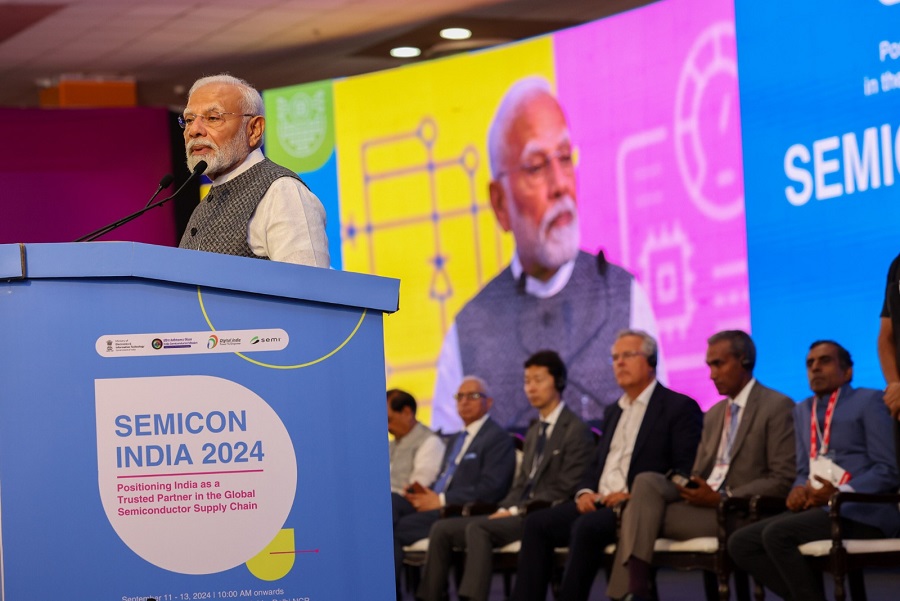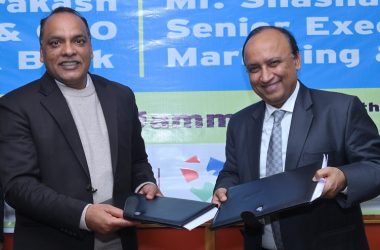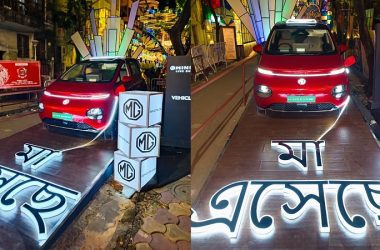India positions itself as a key player in the global semiconductor revolution.
Prime Minister Narendra Modi today inaugurated SEMICON India 2024 at the India Expo Mart in Greater Noida, Uttar Pradesh, marking a significant milestone in the country’s ambition to become a global semiconductor hub. Speaking at the three-day conference, which will run from September 11 to 13, PM Modi outlined a bold vision for India’s role in the semiconductor industry, asserting that India is primed to revolutionize the global tech landscape.
“In the 21st century, India is no longer on the sidelines. When the chips are down, you can bet on India,” the Prime Minister declared, capturing the spirit of an event aimed at showcasing India’s semiconductor strategy and policies. With India now the eighth country in the world to host such a global semiconductor event, Modi highlighted that the time was ripe for investments in India’s burgeoning tech sector.

India’s Three-Dimensional Power
Modi highlighted a “three-dimensional power” driving the country’s rapid progress in semiconductors: a reformist government, a growing manufacturing base, and an aspirational market. This trifecta, according to Modi, is paving the way for India to not only consume but also produce the world’s next-generation chips. “This small chip is doing big things for last-mile delivery in India,” he remarked, underscoring how India’s semiconductor journey is intricately linked to its broader technological ambitions.
The Prime Minister also detailed how India is nurturing a specialized workforce to meet the needs of this rapidly growing industry, stating that 85,000 engineers, technicians, and R&D professionals are being trained to support the country’s semiconductor ecosystem.
A Global Semiconductor Powerhouse in the Making
“Our dream is that every device in the world will have an Indian-made chip,” Modi confidently stated, setting the tone for the event’s ambitious goals. His government has committed to offering substantial financial support for semiconductor manufacturing, including a 50% subsidy for the establishment of production facilities. This move has already attracted investments worth more than ₹1.5 trillion, with more projects in the pipeline.
To further this vision, the Prime Minister announced the establishment of a Semiconductor Research Center, in collaboration with top Indian universities, to develop not only today’s chips but also the next generation. Modi also emphasized India’s push towards securing critical minerals, vital for the industry’s growth, through the recently launched Critical Mineral Mission.
“Silicon Diplomacy” and International Collaborations
Modi pointed to India’s growing global collaborations in the semiconductor space, referring to the concept of “Silicon Diplomacy” as the future of international cooperation. India’s involvement in initiatives such as the QUAD Semiconductor Supply Chain Initiative and its role as Vice Chair of the Indo-Pacific Economic Framework’s Supply Chain Council signify the country’s rising influence in shaping the global semiconductor landscape. Agreements with nations like Japan and Singapore are already in place, and deeper cooperation with the United States is on the horizon.
Building a Resilient Future
The Prime Minister also drew attention to the global challenges posed by supply chain disruptions, emphasizing India’s potential role in building a more resilient system. “Whether it was COVID or war, no industry has been untouched by supply chain disruptions. India is proud to be central to the solution,” he said. Modi affirmed that India’s focus remains on ensuring the world doesn’t pause in times of crisis but keeps moving forward, backed by strong semiconductor infrastructure.
India’s $500 Billion Electronics Goal
A key takeaway from Modi’s address was the integration of India’s semiconductor ambitions with its broader electronics manufacturing goals. Valued at over $150 billion, India’s electronics sector is set to grow to $500 billion by the end of the decade, creating 6 million jobs in the process. “Our goal is for 100% of electronics manufacturing to happen in India. We will not only make the chips, but also the finished products,” Modi asserted.
A Vision for the Future
Concluding his speech, PM Modi stressed that India’s semiconductor ecosystem is not just a solution for its own challenges but for global ones as well. He also highlighted the importance of combining technology with democratic values, warning that when technology is divorced from such values, the consequences are quick and severe.
With global leaders and industry giants from companies like Tata Electronics, NXP Semiconductors, and Renesas in attendance, SEMICON India 2024 is set to further solidify India’s place in the global semiconductor race.






